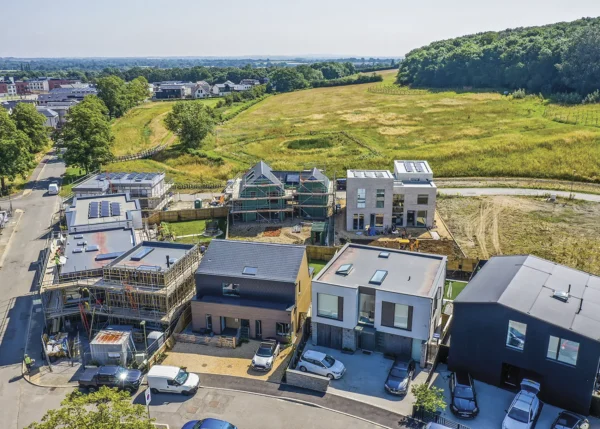Expiring Planning Permission: How to Navigate Planning Consent Deadlines
You have worked hard to achieve planning permission for your new home building project or you have bought a site with planning permission, but you have realised time is running out before it expires. What do you do now?
Here I’m taking a look at the implications of an expiring planning permission and your main options.
Usual Planning Permission Timeframes
Planning permissions tend to be granted with a condition that development needs to start within three years – this is always shown on the planning Decision Notice, which was issued when consent was granted.
If you are buying a building plot with planning permission that you intend to use, check when you need to commence development. You want to ensure that the purchase gives you reasonable time to meet the timescale required. Likewise, if you have consent for works to your own home, be aware that it can take longer to get to the building stage than you might anticipate!
Other types of planning may have slightly different timelines. A decision made through a prior approval process, such as via the conversion of an agricultural building to residential use, requires development to be completed (not commenced) within three years.
In this case, it’s even more crucial for you to have a clear understanding of the project timescale, in order to ensure that you can finish it within three years.
Looking for a plot of land for your self build project? Take a look at PlotBrowser.com to find 1,000s of plots and properties nationwide, all with outline or full planning permission in place
CASE STUDY Bespoke kit homeIf you’ve got a planning condition that requires a bat survey, be aware that you might need to wait some months before it can happen. Bat investigations can only be done between May and September because of when the creatures hibernate. Plus, you might then face delays depending on the results. Caroline and Ian Urquhart had to wait about six months to sort out the required bat surveys and sensitively relocate the protected species to the satisfaction of the conservationists, at a cost of around £3,000, before work on site could begin in earnest. Learn More: Bat Surveys & How to Deal with Bats on Site |
Planning Condition Timeframes
Every permission for development granted by the council will have planning conditions attached. The first is normally the timescale for implementation, but there are often other elements specified as part of the decision that need to be considered. These other conditions will fall into different categories:
- Conditions that need to be adhered to, but require no further action.
- Those that should be dealt with before building works begin.
- Elements that need addressing before construction is finished.
- Things that require action prior to people living in the property.
When you achieve planning permission or you’re buying a site with an existing consent, it’s important to get advice early on. You need to understand what conditions are attached, the work needed to address these and in what timescales that is likely to be achievable.
Some conditions are fairly straightforward (such as providing materials samples) but others are complex or require a more protracted timescale. For example, if you need to investigate ground conditions or ecology, there may be a specific season for that to be undertaken, which could mean you need to wait a while.
More Expert Advice: Planning Applications: What Do Your Local Council Planners Want?
Submitting your Planning Condition Results
Remember that, even when the work is done to address a condition, you need to submit it to the local planning authority to be signed off. This is an eight-week process once the information has been provided. Starting before you hear back would be a risk.
Other requirements can cause delays. For example, legal agreements (relating to highways, access or other obligations) can be a protracted and uncertain process in terms of timescale and resolution. Always investigate the implications of these issues early on.
TOP TIPS in summary
|
What if You’re Running Out of Time?
If any of the above have caused delays and you are close to the deadline, what are your options? In the past, it was possible to extend the life of a permission through a variation, but this is no longer available. There are only two options: implement the permission or apply again.
It is preferable to implement the planning permission if possible. In legal terms, this is the commencement of development, defined in the Town and Country Planning Act (1990) as the earliest date on which a material operation is carried out. This can include construction, demolition, digging foundations, laying out or constructing a road, and a material change in the use of the land. So, in reality, this can constitute quite minor works, for example pegging out a road or creating an access or piling works.
If you are in any doubt and want certainty from the planning authority that works constitute implementation, keep a record of what’s been done and when, seek legal advice and notify, or even get a certificate of lawfulness from the council to agree they tick the boxes.
CASE STUDY Detached two-bed homeGraham and Claire Brennan were keen to buy a plot that came with planning consent for a striking new detached, two-bedroom home. Not only was there planning permission attached, but all the stipulations had been approved – so the details of materials, landscaping and so-on were all pinned down. However, as the approval only had eight months until expiry, they needed to move fast to get work underway within the specified timeframes to avoid needing to reapply for consent. |
Reapplying for Planning Permission
If you can’t make the deadline, the only alternative is to reapply to the council for the same development. A new application should be considered favourably, unless any circumstances have changed since the original consent was approved.
Are there any differences in planning policy since the original permission, to the extent that the decision on the original permission might be different? Or have any other changes in context or circumstances happened to the site or surrounding area? If not, you’ll likely be successful in securing permission again.
However, you’ll still need to pay the planning application fee to the council. Any technical work done for the original application might also need refreshing and updating – particularly in the case of reports with a limited lifespan, for example, ecology. If any reports brought up a change in circumstances affecting the decision, this might lead to uncertainly in securing permission again.
Learn More: Complete Guide to Making a Successful Planning Application
Expiring Planning Permission: Conclusions
It’s preferable in most cases to try to implement the permission. Once done, you’ll have time to address other issues and complete the development in whatever timescale is achievable.
Every planning permission issued is different, therefore if you think there’s going to be an issue or you’re looking to buy a site that comes with planning permission and want to be aware of any challenges in terms of timely implementation, it’s best to seek legal and planning advice as soon as possible.
































































































 Login/register to save Article for later
Login/register to save Article for later
















